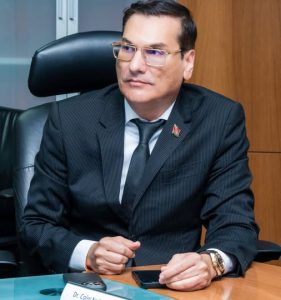By Prior Beharry
WHILE the subsidy will be removed on liquefied petroleum gas (LPG), the price for a 20 pound (lbs) cylinder in Trinidad and Tobago will remain at $20.
This was the assurance given by Minister of Energy and Energy Industries Franklin Khan in the Senate on Tuesday.
He was responding to a motion on the adjournment on the deregulation and liberalisation of the fuel market by Leader of the Opposition in the Upper House Wade Mark.

Khan said in two weeks the government will seek to revise the legislation regarding the subsidy.
He said, “We will now be calculating the price of LPG referenced to the international market price of Mont Belvieu (hub for gas trading), and that now we will still continue to sell it at $20 per cylinder.
“But the difference will now be classified as a subsidy and that money will be taken from the petroleum levy.”
He explained that the Petroleum Production Levy and Subsidy Act was passed in the 1970s took 4% gross revenue from the oil (not gas) companies.
Khan said, “So 4% of 260,000 barrels is significantly different to 4% on 100,000 barrels. So as production continued to slide through time and oil prices keep climbing, they reached to a stage where the curves crossed.”
He noted that in 1977 Trinidad and Tobago reached its highest oil production of 277,000 barrels per day – largely from the Poui, Teak and Samaan fields.

Khan said over the last 14 years, government has had to subsidise fuel price to the tune of $25 billion.
He said this subsidy was in addition to the sometimes $400 million or $500 million coming from the petroleum subsidy levy.
Khan said, “But it reached a stage where the levy was small compared to the size of the subsidy and that was the reason why the government has to subsidise that in such a significant way.”
He said Mark had raised a good point as to what will now happen to the petroleum levy.
Khan said, “Because the Petroleum Levy Act says the levy should cover the subsidy or 4% of gross revenue, whichever is less.
“So if 4% of gross revenue is more than the subsidy, you pay the subsidy.
“If the subsidy is more, you pay the 4%. So if there is no subsidy, what will you use the petroleum levy for?
“Well Senator Mark, for years we have been subsidising LPG.
“And who bore the brunt of that subsidy was not the state – was Petrotrin. That is one part of where I have a soft spot for Petrotrin.
“Because for decades, Petrotrin was by law supposed to sell LPG at the price of 37 cents per lbs. Whereas the international market price is 96 cents, 97 cents, $1 with reference to a place called Mont Belvieu in the Gulf coast.
“That subsidy was borne solely by Petrotrin.”
The energy minister said when the refinery was shutdown, the National Petroleum Marketing Company of T&T (NP) had to now source gas from the open market and from Phenoix Park Gas Processors Limited which makes propane and takes liquids from the natural gas stream and sells at international prices.
Khan said, “That subsidy accounts for over $200 million a year.
“Quietly, nobody says anything about it, but everybody knows you can get a 20 pound cylinder of propane for $20 plus transport. That same 20 pound cylinder in Jamaica sells for the equivalent of TT $100, and Trinidadians have grown accustomed to that.”

He added that with the revision of the legislation, the price of LPG will now be referenced to the international market but “we will still continue to sell it at $20 per cylinder.”
Khan said the difference will now be classified as a subsidy and that money will be taken from the petroleum levy.
He said, “And our calculation shows that the petroleum levy will own a bulk of it. So the petroleum levy will not go to waste with the liberalisation of the liquid fuels.”

Earlier Mark had called on Khan to bring the country “up to speed” with the policy decision concerning the deregulation and liberalisation of the fuel market.
He said, “In the 2021 budget, the government announced the deregulation and liberalisation of the fuel market. That is, gasoline prices, diesel, premium, super, according to the Government, will now be deregulated and liberalised and that is supposed to take effect from the end of January of 2021.”
Mark said, “After some 46 years of fuel subsidies, because of we being owners of oil and gas, that is the people of this country, this PNM Government has decided to remove fuel subsidies and allow the market literally to determine the price of fuel.
“So what the Government has said in essence is that there will no longer be a fuel subsidy.”

Mark said, “I am asking the honourable minister whether the time has not come to place that subsidy, that particular subsidy that was on companies that were producing crude oil, whether that now should not go to companies that are producing gas.
“Should we not impose a subsidy on the gas producers, particularly those who are now getting higher gas prices, the up-streamers as they are called and putting the NGC and the whole Point Lisas Industrial Estate in jeopardy?
Whether the time has not come for that to take place?”
He said, “If the Government was creative, they would have transferred that subsidy onto the gas up-streamers, let them subsidise the population because that is our natural gas that they are using, they are selling and directly exporting.”
![]()











